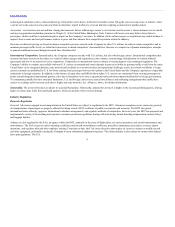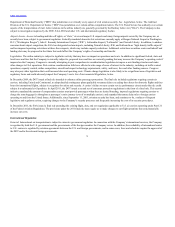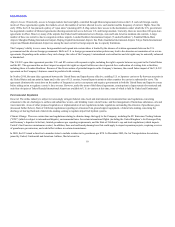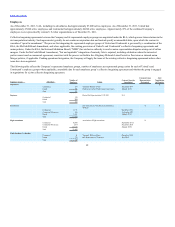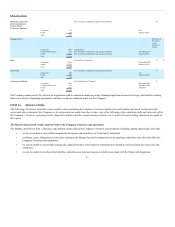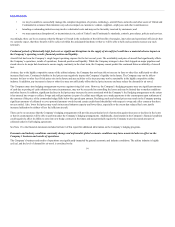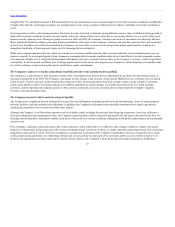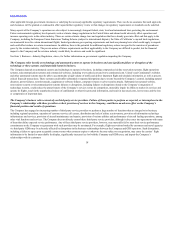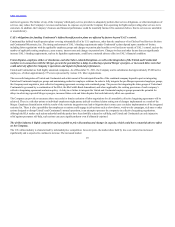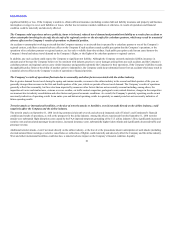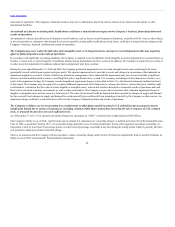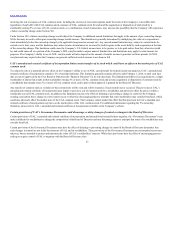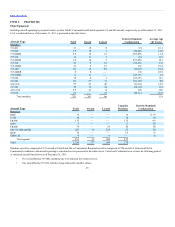United Airlines 2011 Annual Report Download - page 19
Download and view the complete annual report
Please find page 19 of the 2011 United Airlines annual report below. You can navigate through the pages in the report by either clicking on the pages listed below, or by using the keyword search tool below to find specific information within the annual report.
Table of Contents
other applicable foreign government clearances or satisfying the necessary applicable regulatory requirements. There can be no assurance that such approvals
and clearances will be granted or continued in effect upon further regulatory review or that changes in regulatory requirements or standards can be satisfied.
Many aspects of the Company’s operations are also subject to increasingly stringent federal, state, local and international laws protecting the environment.
Future environmental regulatory developments, such as climate change regulations in the United States and abroad could adversely affect operations and
increase operating costs in the airline industry. There are certain climate change laws and regulations that have already gone into effect and that apply to the
Company, including the European Union Emissions Trading Scheme (subject to international dispute), the State of California’s cap and trade regulations,
environmental taxes for certain international flights, limited greenhouse gas reporting requirements and land-use planning laws which could apply to airports
and could affect airlines in certain circumstances. In addition, there is the potential for additional regulatory actions in regard to the emission of greenhouse
gases by the aviation industry. The precise nature of future requirements and their applicability to the Company are difficult to predict, but the financial
impact to the Company and the aviation industry would likely be adverse and could be significant.
See Item 1, Business—Industry Regulation above, for further information on government regulation impacting the Company.
The Company relies heavily on technology and automated systems to operate its business and any significant failure or disruption of the
technology or these systems could materially harm its business.
The Company depends on automated systems and technology to operate its business, including computerized airline reservation systems, flight operations
systems, telecommunication systems and commercial websites, including www.united.com and www.continental.com. United’s and Continental’s websites
and other automated systems must be able to accommodate a high volume of traffic and deliver important flight and schedule information, as well as process
critical financial transactions. These systems could suffer substantial or repeated disruptions due to events beyond the Company’s control, including natural
disasters, power failures, terrorist attacks, equipment or software failures, computer viruses or cyber security attacks. Substantial or repeated website,
reservations systems or telecommunication systems failures or disruptions, including failures or disruptions related to the Company’s integration of
technology systems, could reduce the attractiveness of the Company’s services versus its competitors, materially impair its ability to market its services and
operate its flights, result in the unauthorized release of confidential or otherwise protected information, and result in increased costs, lost revenue and the loss
or compromise of important data.
The Company’s business relies extensively on third-party service providers. Failure of these parties to perform as expected, or interruptions in the
Company’s relationships with these providers or their provision of services to the Company, could have an adverse effect on the Company’s
financial position and results of operations.
The Company has engaged an increasing number of third-party service providers to perform a large number of functions that are integral to its business,
including regional operations, operation of customer service call centers, distribution and sale of airline seat inventory, provision of information technology
infrastructure and services, provision of aircraft maintenance and repairs, provision of various utilities and performance of aircraft fueling operations, among
other vital functions and services. The Company does not directly control these third-party service providers, although it does enter into agreements with many
of them that define expected service performance. Any of these third-party service providers, however, may materially fail to meet their service performance
commitments to the Company or agreements with such providers may be terminated. For example, flight reservations booked by customers and travel agencies
via third-party GDSs may be adversely affected by disruptions in the business relationships between the Company and GDS operators. Such disruptions,
including a failure to agree upon acceptable contract terms when contracts expire or otherwise become subject to renegotiation, may cause the carriers’ flight
information to be limited or unavailable for display, significantly increase fees for both the Company and GDS users, and impair the Company’s
relationships with its customers
18


